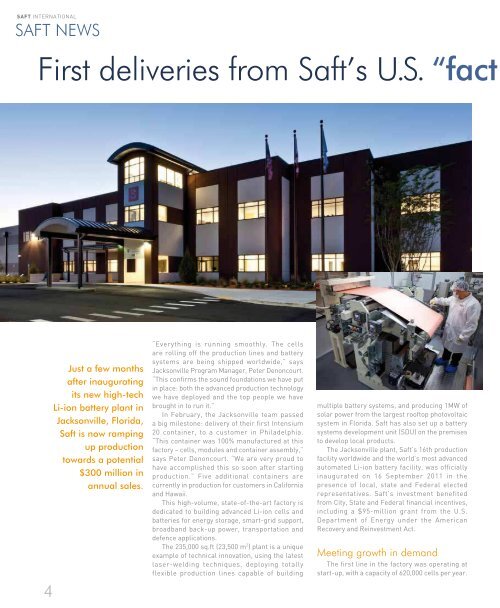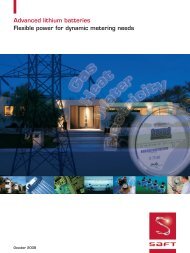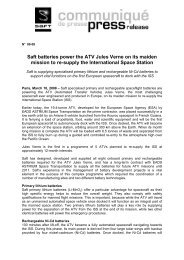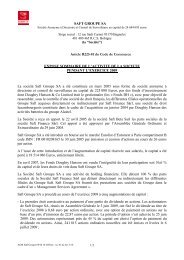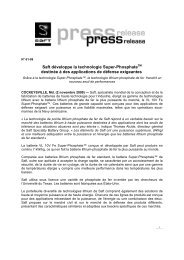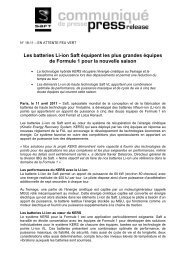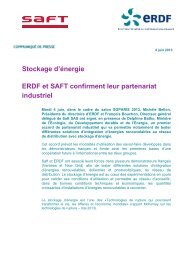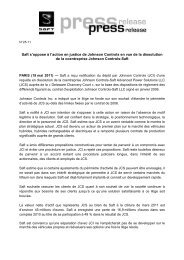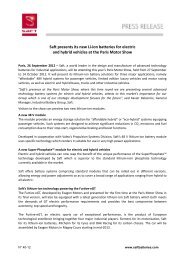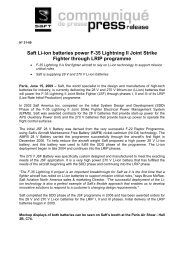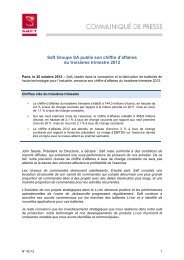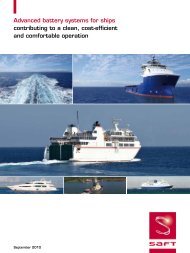Linde Material Handling - Saft
Linde Material Handling - Saft
Linde Material Handling - Saft
You also want an ePaper? Increase the reach of your titles
YUMPU automatically turns print PDFs into web optimized ePapers that Google loves.
SAFT InternatIonal<br />
saft news<br />
first deliveries from saft’s u.s. “fact ory of the future” in Jacksonville<br />
Just a few months<br />
after inaugurating<br />
its new high-tech<br />
Li-ion battery plant in<br />
Jacksonville, Florida,<br />
saft is now ramping<br />
up production<br />
towards a potential<br />
$300 million in<br />
annual sales.<br />
“everything is running smoothly. The cells<br />
are rolling off the production lines and battery<br />
systems are being shipped worldwide,” says<br />
Jacksonville program manager, peter Denoncourt.<br />
“This confirms the sound foundations we have put<br />
in place: both the advanced production technology<br />
we have deployed and the top people we have<br />
brought in to run it.”<br />
in February, the Jacksonville team passed<br />
a big milestone: delivery of their first intensium<br />
20 container, to a customer in philadelphia.<br />
“This container was 100% manufactured at this<br />
factory – cells, modules and container assembly,”<br />
says peter Denoncourt. “We are very proud to<br />
have accomplished this so soon after starting<br />
production.” Five additional containers are<br />
currently in production for customers in California<br />
and Hawaii.<br />
This high-volume, state-of-the-art factory is<br />
dedicated to building advanced Li-ion cells and<br />
batteries for energy storage, smart-grid support,<br />
broadband back-up power, transportation and<br />
defence applications.<br />
The 235,000 sq.ft (23,500 m 2 ) plant is a unique<br />
example of technical innovation, using the latest<br />
laser-welding techniques, deploying totally<br />
flexible production lines capable of building<br />
multiple battery systems, and producing 1mW of<br />
solar power from the largest rooftop photovoltaic<br />
system in Florida. <strong>Saft</strong> has also set up a battery<br />
systems development unit (SDu) on the premises<br />
to develop local products.<br />
The Jacksonville plant, <strong>Saft</strong>’s 16th production<br />
facility worldwide and the world’s most advanced<br />
automated Li-ion battery facility, was officially<br />
inaugurated on 16 September 2011 in the<br />
presence of local, state and Federal elected<br />
representatives. <strong>Saft</strong>’s investment benefited<br />
from City, State and Federal financial incentives,<br />
including a $95-million grant from the u.S.<br />
Department of energy under the American<br />
recovery and reinvestment Act.<br />
Meeting growth in demand<br />
The first line in the factory was operating at<br />
start-up, with a capacity of 620,000 cells per year.<br />
The plan is to start up a second line in the second<br />
half of 2012 and a third a year later. This will ramp<br />
up production to about 2.3 million cells per year,<br />
in several sizes including cylindrical and prismatic<br />
cell formats. By the end of 2013, Jacksonville will<br />
have 3 fully-automated cell production lines with<br />
a production capacity of 372 mWh per year.<br />
“This will allow us to meet future demand<br />
from growing markets, particularly for broadband<br />
telecoms and renewable-energy applications<br />
that often need substantial amounts of energy<br />
storage,” says Jacksonville program manager,<br />
peter Denoncourt. The 3 lines for start-up will<br />
take up about half the available space, leaving<br />
room to set up 3 more lines once demand justifies<br />
it. The plant will employ around 300 people when<br />
fully invested.<br />
top priority: quality<br />
The Jacksonville factory has a very high degree<br />
of automation, through cell assembly and beyond.<br />
From winding the jellyrolls and sealing them<br />
until after formation and OCV testing there is no<br />
human contact with the cells. From the winder,<br />
the jellyrolls are processed into completed cells,<br />
filled with electrolyte and then automatically<br />
transported to the formation building. The job of<br />
the operators is to monitor the process and keep<br />
the machines supplied with parts and materials.<br />
“As we are producing high-tech products<br />
in high volume, Quality Control has been top<br />
priority right from the design stage”, says peter<br />
Denoncourt, who was also project manager for<br />
the plant’s construction. “We insisted on Quality<br />
plans from both the building contractor and our<br />
equipment suppliers. now that production has<br />
begun, all workspaces have to comply with very<br />
stringent cleanliness standards so that <strong>Saft</strong> can<br />
guarantee customers a low self-discharge rate.<br />
Also, as lithium reacts strongly to moisture<br />
and this could have a strong negative impact<br />
on battery quality, therefore our Li-ion cells<br />
are manufactured in a carefully-controlled ‘dry<br />
environment’.<br />
Manufacturing and sustainable<br />
development<br />
<strong>Saft</strong>’s Jacksonville plant was designed to<br />
comply with the Leadership in energy and<br />
environmental Design (LeeD) programme, and the<br />
plant was awarded Silver certification in February<br />
2012 in recognition of the many sustainability<br />
<strong>Saft</strong> inaugurated its new factory in September 2011<br />
and energy-conserving features of the building<br />
and landscape design. LeeD features include:<br />
design elements to reduce the plant’s carbon<br />
footprint; capture of rainwater for use in toilets<br />
and irrigation; native species in landscaping to<br />
reduce maintenance; motion-sensor light cut-off<br />
in offices; high-efficiency fluorescent lighting; and<br />
solar pV panels on the roof to help meet power<br />
demand. Of course the pV array will have energystorage<br />
batteries manufactured on the site, and<br />
there are not many factories that do that! As in all<br />
<strong>Saft</strong> plants, raw materials are recycled wherever<br />
possible so as to reduce waste, and careful<br />
attention is being paid to controlling emissions<br />
and discharge.<br />
peter.denoncourt@saftbatteries.com<br />
Jacksonville delivers its first<br />
Intensium Max container<br />
4 5<br />
SAFT InternatIonal


